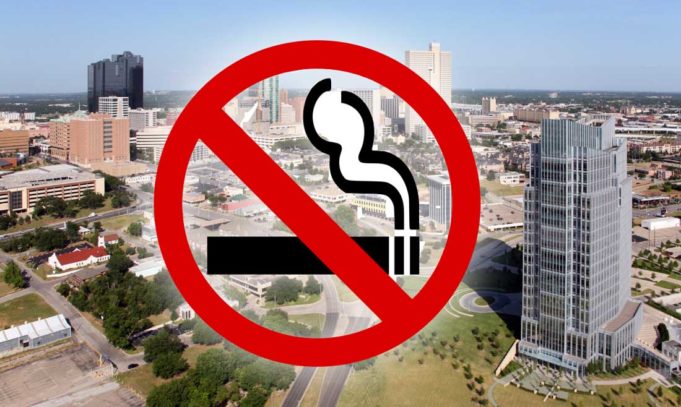Many people may be tired of it, going to a rock show or happy hour at the bar down the street and being forced to breathe in 10 packs’ worth of secondhand smoke. Every other big city in Texas has done away with lighting up indoors. Except Fort Worth. However, a coalition of local health groups is working overtime to place a nonsmoking ordinance back on the city council’s agenda.
Formed about two years ago, Smoke-Free Fort Worth has been holding meetings with city officials regularly for about the past year.
“Some [councilmembers] are very enthusiastic,” said Dolores Garza, Smoke-Free Fort Worth’s campaign manager. “Others said it wasn’t a priority.”
Garza added that sometime between June and August is when they plan to bring a smoke-free ordinance before the council.
Smoke-Free Fort Worth, she said, aims to close several loopholes that allow smoking indoors at businesses like bars and bingo halls.
Fort Worth’s current smoking ordinance, passed in 2007, prohibits smoking in restaurants and offices. Dr. Mark Koch, the nonprofit’s co-chair, said secondhand smoke is a serious public health concern. Between 2005 and 2009, an average of 34,000 Americans died annually as the result of secondhand smoke exposure, according to the Centers for Disease Control and Prevention.
Along with discussions with public officials, Garza and dozens of Smoke-Free Fort Worth volunteers regularly set up booths at community events or attend neighborhood association meetings to spread the word. The nonprofit coalition, which includes The American Cancer Society, American Lung Association, and American Heart Association, holds monthly meetings to coordinate work among its members. Proponents of the movement are encouraged to join a list of supporters at smokefreefw.org. Claudia Rodas, director for the smoking awareness group Tobacco Free Kids, said Smoke-Free Fort Worth has more than 3,500 individuals and dozens of private business as supporters. Individuals are asked to volunteer at group events, recruit coalition members, and speak as needed at city council meetings.
Rodas added that the smoke-free movement is intended to ensure “workers have a safe environment to work in as well as patrons who are exposed to secondhand smoke while working or visiting the city. We are really just catching Fort Worth up to where all the other major cities are in Texas.”
It’s not a smoking ban, she continued, referring to what she said is a common misconception of her group’s efforts.
“If you are smoking on the patio, that’s different than smoking indoors,” she said. “We are not telling people to stop smoking. Just please go outside.”
Last month, Arlington City Council voted to add bars, billiard halls, and several other kinds of businesses to the city’s smoking ordinance. The establishments were previously exempted from smoking restrictions.
An online petition seeking to amend Arlington’s ordinance highlights common complaints about the top-down approach to limiting smoking, though. The petition currently has 359 supporters and a goal of 500.
“It’s government overreach,” commented one Arlington resident online. “Cigarettes, cigars, and pipes are not illegal.”
Perry Tong, co-owner of Pop’s Safari Room in the West 7th corridor, said he’s been battling groups like Smoke-free Fort Worth for years.
“Certain people want to tell you how to live and what to do and when to do it,” he said. “I just want them to leave people alone who want to enjoy smoking.”
Garza and Rodas said they haven’t experienced major pushback from the public and are quick to point out that several private Fort Worth businesses have recently opted to go smoke-free on their own, including Poag Mahone’s and Billy Bob’s Texas. Poag’s co-owner Glen Keely told the Weekly last fall that since going smoke-free, his business has been “busier than ever.”
Garza said a lot of bar owners are supportive of a revised smoking ordinance: “There’s hesitancy to come out in public and say they want to go smoke-free. They would rather there be an ordinance they are simply following.”
Smoke-Free Fort Worth is also encouraging city council to include e-cigarettes (e-cigs) in any updated smoking ordinance. Rodas said there is a common misconception that e-cigs are a healthier alternative to cigarettes. A 2016 report by the U.S. Surgeon General states that e-cigs are the most common tobacco product used by youth, and the use of e-cigs is linked to lung disease and other ailments.
One long-term goal of Smoke-Free Fort Worth is the passage of a state law that prohibits indoor smoking at public places. Rodas said her group has tried several times to lobby the Texas Legislature to take up the issue but with no luck. The smoke-free effort has subsequently focused on individual municipalities. After two years of grassroots work, Garza and Rodas said the Fort Worth community is now aware of Smoke-Free Fort Worth’s goals. Now it’s time to enact city policy, they said.
“After almost a decade of workers still being exposed to the dangers of secondhand smoke, the Smoke-Free Fort Worth coalition felt strongly that it was important to come back to council to ask them to protect all workers,” Rodas said.
City Councilmember Ann Zadeh said in an email that she and other councilmembers have been in regular contact with Smoke-Free Fort Worth directors and volunteers.
At the moment, Zadeh said, there is not a “clear consensus” among councilmembers on what a new smoking ordinance would look like, adding that her staff is currently collecting information on the matter.
“I would say that with new councilmembers … and the upcoming summer break, we may be looking at this sometime late summer,” she said.













Fort Worth needs to join the 21st century,and put its residents first.The city council needs to stop taking bribes from bars and resteraunts.
I would love to be able to go out and enjoy myself without worrying about having an asthma attack or getting a migraine. I know I sound super cool after that statement 🙄 But unfortunately that’s my reality.
How about let the businesses decide? We live in a free society, and tobacco is a legal product. These businesses are private property. Have a beef with tobacco? Just declare it unsafe for human consumption and ban it completely. Take a principled position. But stop the social engineering and trampling of private property rights. Its a slippery slope which could be applied to a myriad of lifestyle choices, as you’ve seen it played out other places with sugary beverage bans, trans fat, proposed laws requiring mothers to breastfeed etc, etc. Don’t like the food? Dont go. Music’s too loud? Don’t go! Bar accommodates smokers and you don’t like it? Don’t go. PS: I don’t smoke cigarettes.